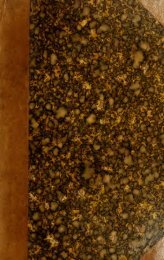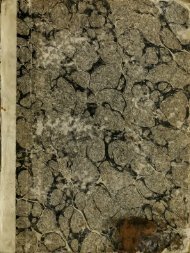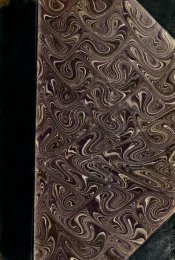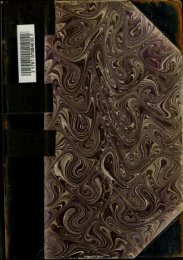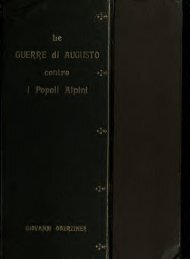Figurative uses of animal names in Latin and their ... - mura di tutti
Figurative uses of animal names in Latin and their ... - mura di tutti
Figurative uses of animal names in Latin and their ... - mura di tutti
Create successful ePaper yourself
Turn your PDF publications into a flip-book with our unique Google optimized e-Paper software.
Much homely wisdom <strong>and</strong> many shrewd observations on<br />
life were stored up <strong>in</strong> <strong>animal</strong> proverbs.** Pr<strong>of</strong>ert cornua<br />
'vultur,^'^ 'the vulture grows horns,' represented the impos-<br />
sible; piscari <strong>in</strong> aerej^^ 'to fish <strong>in</strong> air,' signified the use-<br />
less; lupo agnum eripere^^ 'to rescue the lamb from the<br />
wolf,' typified the <strong>di</strong>fficult.<br />
Denies can<strong>in</strong>i were used <strong>in</strong> eat<strong>in</strong>g; the door <strong>of</strong> a mistress<br />
was subjected to a vigorous arietatio; senectus cerv<strong>in</strong>a denoted<br />
longevity.<br />
The farmer supported his v<strong>in</strong>es with cervi, the architect<br />
planned a testudo, the surgeon operated with a corvus, the<br />
veter<strong>in</strong>arian treated a ranula, the sol<strong>di</strong>er shot with a scorpio,<br />
the <strong>in</strong>fantryman rallied round an aquila, an ursa roamed<br />
the heavens, the gambler threw a canis, the lover called<br />
his sweetheart passer, the botanist searched for a dracon-<br />
tium, the jeweler prized a chelidonia gemma. A new spe-<br />
cies <strong>of</strong> fish was observed, it grunted, it became the porcus<br />
^mar<strong>in</strong>us; the unfamiliar elephant was called Luca bovis;^""<br />
camelopardalis^^ visualized prom<strong>in</strong>ent phases <strong>of</strong> two <strong>animal</strong>s<br />
better known.<br />
Christianity made its advent. Agnus signified the Master,<br />
Draco, the Devil, phoenix, the resurrection, Ix'^^t the<br />
new religion.<br />
The absence <strong>of</strong> the figurative <strong>and</strong> derived <strong>uses</strong> <strong>of</strong> <strong>animal</strong><br />
<strong>names</strong> would seriously impair the resources <strong>of</strong> a language.<br />
Each <strong>animal</strong> has some <strong>di</strong>st<strong>in</strong>guish<strong>in</strong>g trait, so that<br />
the satirist is provided with a full quiver from which to<br />
shoot the shafts <strong>of</strong> ri<strong>di</strong>cule, the comic poet with a perennial<br />
fount from which to draw a supply <strong>of</strong> humor. A slight<br />
<strong>in</strong>dex <strong>of</strong> the loss <strong>in</strong>cident to the exclusion from Lat<strong>in</strong> <strong>of</strong><br />
derived <strong>uses</strong> <strong>of</strong> <strong>animal</strong> <strong>names</strong> may be obta<strong>in</strong>ed by try<strong>in</strong>g<br />
° Cf. Genthe, Epistula de proverbiis Romanorum ad <strong>animal</strong>ium naturam<br />
fert<strong>in</strong>entibus ; Sylvio Kohler, Das Tierleben im Sprichwort der Griechen<br />
und Romer; A. Otto, Die Sprichworter und sprichwortlkhen Redensarten<br />
.der Romer, Das Tierreich, p. 384 sqq.<br />
"Claud, xviii, 352.<br />
" Plaut. Asm. 99.<br />
" Plaut. Poen. 776.<br />
" Naevius ap. Varro, L<strong>in</strong>g, vii, 39.<br />
"... quod erat figura ut camelus, maculis ut panthera; Varro, L<strong>in</strong>g, v,<br />
100.


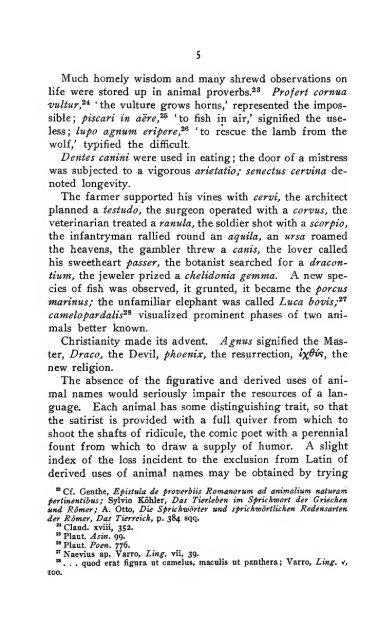
![Das Kriegswesen der Alten [microform] - mura di tutti](https://img.yumpu.com/21606999/1/167x260/das-kriegswesen-der-alten-microform-mura-di-tutti.jpg?quality=85)
